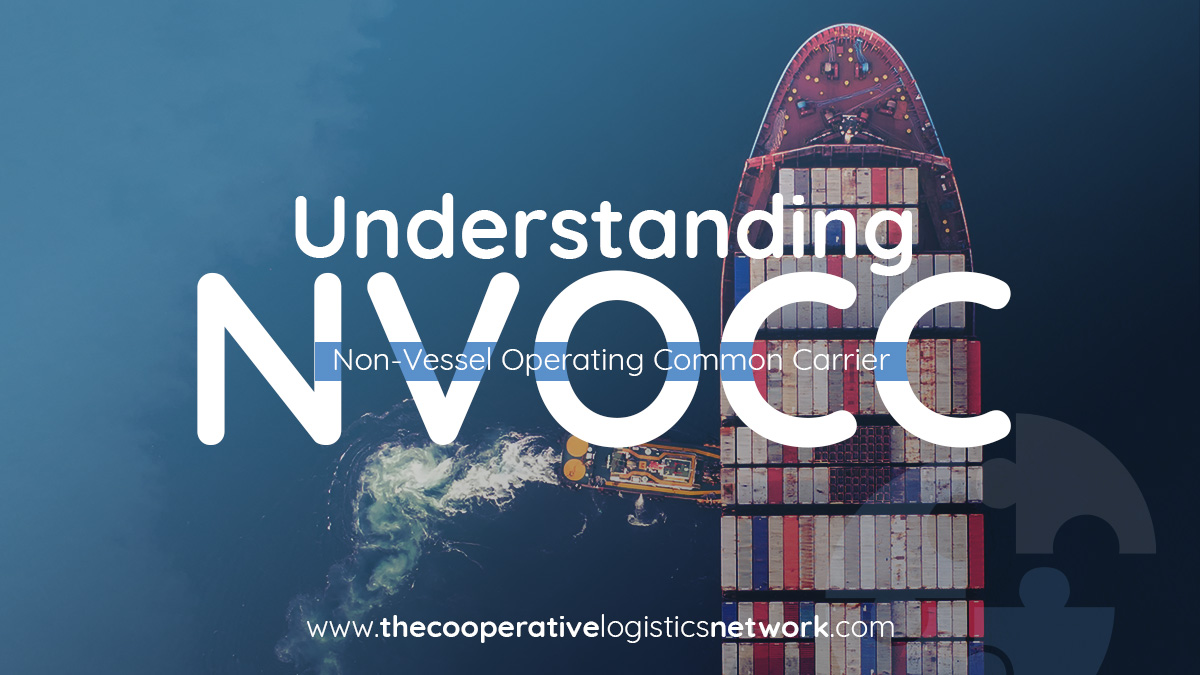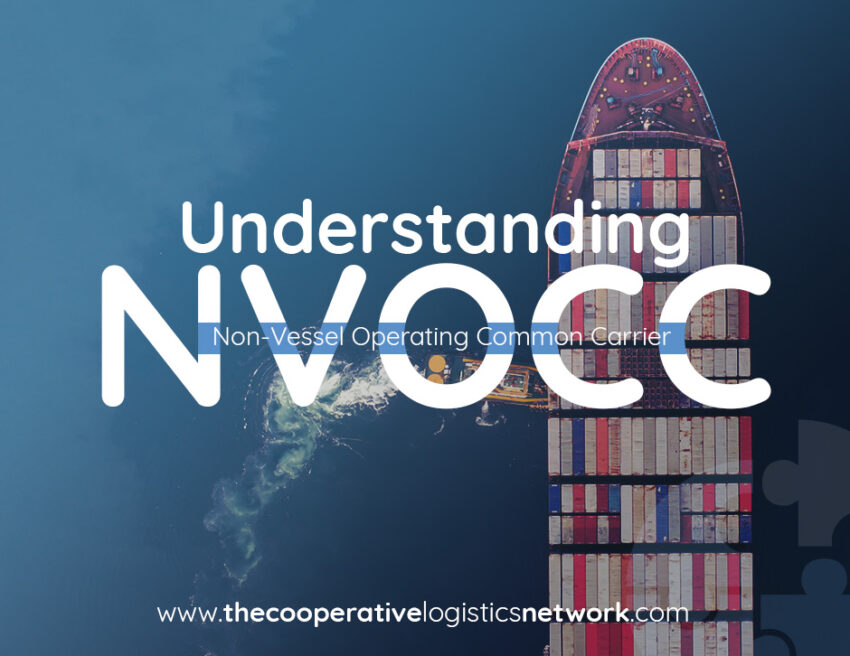The shipping industry plays a vital role in global trade, ensuring the seamless movement of goods across international borders. Among the key players in this industry, Non-Vessel Operating Common Carriers (NVOCCs) have emerged as a crucial link between shippers and carriers. NVOCCs facilitate cargo transportation without owning vessels, making them indispensable for businesses that rely on global trade. In this blog, we will explore the concept of NVOCC, its role in the logistics sector, and its significance for freight forwarding companies.

Understanding NVOCC: Definition and Role
NVOCC stands for Non-Vessel Operating Common Carrier, a term used to describe companies that handle ocean freight shipments without owning or operating their own vessels. Instead, these entities lease space from vessel operators and sell it to customers, often consolidating smaller shipments into full-container loads. NVOCCs issue their own House Bill of Lading (HBL), take responsibility for cargo handling, and manage the logistics of international shipments.
For a freight forwarding company, partnering with an NVOCC offers significant advantages, including access to competitive freight rates, reliable sailing schedules, and better cargo consolidation services.
The Key Functions of NVOCCs
NVOCCs perform several critical functions that simplify shipping processes for businesses and freight forwarders. These include:
- Cargo Consolidation – NVOCCs combine shipments from multiple shippers into a single container to optimize costs and space utilization.
- Issuing House Bill of Lading (HBL) – They provide customers with an HBL, which acts as proof of shipment and contractual documentation.
- Negotiating Freight Rates – Since NVOCCs buy cargo space in bulk, they can negotiate competitive rates with shipping lines and offer cost-effective solutions.
- Customs Clearance Assistance – Many NVOCCs help with customs documentation, ensuring smooth clearance at destination ports.
- Logistics and Freight Management – They oversee the entire shipping process, including booking, tracking, and delivery coordination.
Differences Between NVOCC and Freight Forwarding Companies
Although NVOCCs and freight forwarding companies operate within the same logistics ecosystem, they serve distinct functions.
- Ownership of Bill of Lading – NVOCCs issue their own HBL, while freight forwarders use the Master Bill of Lading (MBL) issued by the shipping line.
- Legal Responsibilities – An NVOCC is considered a carrier in the eyes of the law, taking on more liability than a freight forwarder.
- Operational Scope – Freight forwarders offer a broader range of logistics services, including air freight, warehousing, and inland transportation, whereas NVOCCs focus primarily on ocean freight.
In many cases, freight forwarding companies work closely with NVOCCs to provide comprehensive shipping solutions to their clients.
NVOCC Licensing and Regulation
To operate legally, NVOCCs must obtain the necessary licenses and comply with regulatory requirements set by various governing bodies. Licensing regulations vary by country, but some of the key steps to obtaining an NVOCC license include:
- Business Registration – The company must be registered as a legal entity in the jurisdiction where it intends to operate.
- Financial Requirements – Many regulatory bodies require NVOCCs to demonstrate financial stability by providing a surety bond or maintaining a certain net worth.
- Application Submission – Companies must submit an application to the relevant maritime authority, such as the Federal Maritime Commission (FMC) in the United States.
- Compliance with Industry Standards – NVOCCs must adhere to international shipping laws, tariff filing requirements, and operational guidelines.
- Renewal and Reporting – Once licensed, NVOCCs must periodically renew their license and report their activities to regulatory bodies.
Who Needs an NVOCC License?
An NVOCC license is essential for companies that wish to operate as common carriers without owning their own vessels. Businesses that typically require an NVOCC license include:
- Independent NVOCCs – Companies that focus solely on ocean freight services and issue their own HBL.
- Freight Forwarding Companies – Some freight forwarders obtain an NVOCC license to expand their service offerings and manage ocean freight more effectively.
- Logistics Providers – Firms that handle large-scale cargo movements may require an NVOCC license to ensure compliance with global trade regulations.
Having an NVOCC license not only enhances credibility but also ensures that companies can legally negotiate contracts, issue bills of lading, and provide reliable shipping services.
The Importance of NVOCCs in Global Trade
NVOCCs contribute significantly to the efficiency and cost-effectiveness of international shipping. Their role is essential for various reasons:
- Enhancing Shipping Flexibility – NVOCCs provide tailored shipping solutions, accommodating various cargo types and trade routes.
- Cost-Effective Solutions – By consolidating shipments and negotiating lower rates, NVOCCs help businesses reduce freight costs.
- Supporting Small and Medium Enterprises (SMEs) – SMEs often lack the volume to book full container loads (FCL). NVOCCs enable them to ship goods cost-effectively through Less than Container Load (LCL) services.
- Expanding Global Reach – NVOCCs maintain partnerships with multiple shipping lines, providing businesses with access to diverse trade routes and destinations.
- Ensuring Reliability and Accountability – As contract carriers, NVOCCs take responsibility for cargo movement, ensuring transparency and security throughout the shipping process.
Challenges Faced by NVOCCs
Despite their numerous advantages, NVOCCs face several challenges in the shipping industry:
- Regulatory Compliance – NVOCCs must comply with international shipping laws, customs regulations, and licensing requirements, which vary by country.
- Market Competition – The rise of digital freight platforms and direct carrier bookings have increased competition for NVOCCs.
- Operational Risks – Delays, cargo damage, and incorrect documentation can lead to financial and reputational losses.
- Fluctuating Freight Rates – Volatile shipping costs impact the profitability and pricing strategies of NVOCCs.
Conclusion: The Vital Role of NVOCCs in the Transportation and Logistics Industry
NVOCCs play a pivotal role in modern logistics, bridging the gap between shippers and vessel operators while ensuring smooth cargo movement across international waters. Their expertise in freight consolidation, rate negotiation, and logistics management makes them invaluable partners for businesses and freight forwarding companies alike.
As global trade continues to grow, the importance of NVOCCs will only increase, making them a fundamental component of the shipping industry. By embracing technological advancements and addressing industry challenges, NVOCCs can continue to drive efficiency, cost savings, and innovation in international freight transportation.


